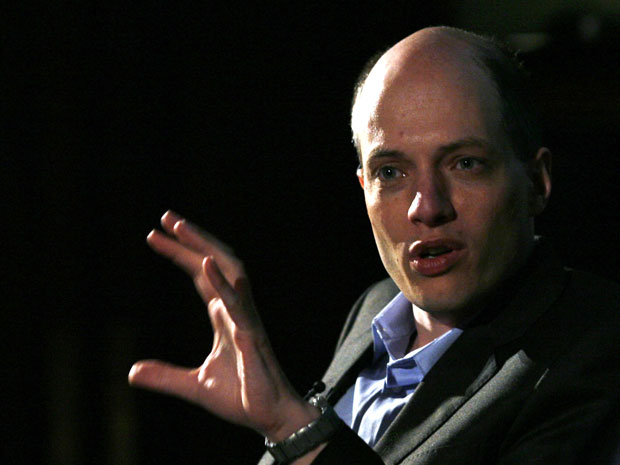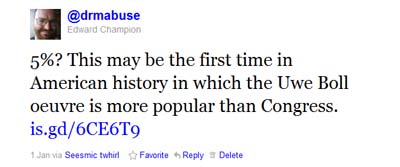Jeanette Winterson appeared on The Bat Segundo Show #451. She is most recently the author of Why Be Happy When You Could Be Normal?
Listen: Play in new window | Download
Condition of Mr. Segundo: Reconsidering the ever-shifting happy/normal life spectrum.
Author: Jeanette Winterson
Subjects Discussed: How the brain spins around, getting two marriage proposals, sleeping in a brothel in Los Angeles, people who copulate in corridors, “part fact part fiction” as a cover story, Winterson’s obligations to the facts, how a new life can be found in the form of a book, a life ending that nobody wants, how literature allows an intervention into that fateful feeling of life, imaginative freedom, adopted children and being a control freak, the cyclical nature of Winterson’s work, performance spring from fiction and performance turning into nonfiction, Witnerson World, trusting the creative process, the problems with creative writing schools, Ulysses and the return, T.S. Eliot, making sense of the whole pattern of your life, textual foundation, avoiding the term “memoir,” life imitating art, David A. Hogue’s Remembering the Future, Imagining the Past, precise measurement and comparison within Winterson’s work, the importance of detail, the benefits of seeing the world in little, Winterson’s addiction to Twitter, compartmentalizing the world, wooing online people towards books, the generation of the actual, comparisons between Kindle and phone sex, the problems with guys who watch porn, examining a stranger’s bookshelves, virtual realms, Mrs. Winterson reading Jane Eyre and reinventing the end, Jean Rhys’s Wide Sargasso Sea, Our Correspondent’s problems trying to read Jane Eyre, how containing an adopted mother in words insulates her from the reader, revealing too much of yourself through writing, eccentricity and order, Winterson’s morning bicycle routine, secret rooms in Paris, playing with all your possible selves, solitude as a necessary condition to create something, the reader impression of Mrs. Winterson as a monster, the NORI brick and the Empire State Building, reclaiming Accrington, Winterson’s connection with the North, Manchester, making space in the self for things to come back, how books are more clever than their writers, how Winterson stole a cat and used this incident to teach a moral lesson, memory, screaming as a two-year-old, being a devil baby, the absurd sound of sentences, saying yes to life, false starts and messing things up, how people are presently creating a dystopian society, and how storytelling can help people to live.
EXCERPT FROM SHOW:
Correspondent: Speaking of Mrs. Winterson [JW’s adopted mother], there is a dash-driven paragraph about halfway through the book where you have her applying various charges to locations. Bestiality for the pet parlor, unmarried mothers to the day nursery. So to what degree does containing Mrs. Winterson in words help you to insulate her both from yourself and also, while we’re talking about this idea of what the reader takes away, the readership?
Winterson: Well, I think this time I let her loose. She is also the Dog Woman in Sexing the Cherry. The gigantic lonely philosophical creature who adopts Jordan from the banks of the River Thames. I’ve worked with her often. As a dream figure. As a psychopath, which I suppose she was in a way. But also as a psychopomp, which in myth stories is the strange part-angel, part-devil creature who often tells the stories. You find them in the Arabian Nights very often. There’s kind of a liminal creature inhabiting two worlds. Which in a way she did. Because she lived in end times. She was waiting for Armageddon. And that’s what she wanted. So she was only ever partly in our world. She called life a pre-death experience, which tells you a lot about her psyche. So I wasn’t insulating myself any longer. I had to do that in Oranges because that was a cover version I could live with. I couldn’t have told the story twenty-five years ago. I really couldn’t. That would have been the end of me. And it would have been a very different trajectory for me. But I can tell it now. And I wanted to release her — like the genie, like the 300-foot genie from the bottle — and give her back to the reader. Because I think the reader comes out feeling compassion for this woman. Sympathy even. And also understanding more both about me — Jeanette Winterson the writer — and also about the place that I come from. It’s not covered up at all. I think this is the most revealed book that I have ever written. Which is not to say that the language isn’t as conscious or as taut as I liked it to be. It’s important to me to work with language. But it is a completely honest book. It’s a truthful book, yeah.
Correspondent: Can you reveal too much of yourself through these particular projects?
Winterson: Yes, you can. You can get very overshary if you’re not careful.
Correspondent: How have you stopped yourself from doing this? Do you have a good team that’s going to say, “Hey, Jeanette, maybe you don’t actually want to tell the world that”?
Winterson: No. I made a choice. And it’s the center of the book. There’s one page called “Intermission.” And I say, “I’m going to miss out twenty-five years.” Which I thought would be good for the memoir anyway. Because I thought, this time, the form got a kick up the ass. It became just a bit more fluent and less linear. So I thought, well, that would give people a later clue. They won’t feel so bound to go through this from A to Z. And I did that in order not to bring in lots of people from the middle of my life, which would have turned it more into a kiss-and-tell book. And it would have been about sex and gossip and money. And I thought, I’m not letting this be hijacked by the lurid press. I’m going to tell the stories I need to tell and miss out the things which will spoil the story in a real way. By that, I mean, whether it’s a spoiler and a spoiling.
Correspondent: But where does order come in for you? I mean, you’re reading the books in the library A to Z.
Winterson: I was.
Correspondent: And this leads me to ask you — because I also know that at the very beginning of each day, instead of bicycling to work — most of us who work in the freelance world have the ideal commute. Bed to desk. Thirty seconds. Best commute in the world, right? You, on the other hand, get into a stationary bike and you start just jamming in that for a while.
Winterson: Oh no! It’s not stationary.
Correspondent: It’s not stationary?
Winterson: No.
Correspondent: Oh! You actually do ride the bicycle!
Winterson: I do!
Correspondent: Really?
Winterson: Yes, but I come right back to where I started from. So we may be at the start of our conversation.
Correspondent: Aha!
Winterson: I have a studio in the garden of my house. But I will not leave my house and walk over to the studio.
Correspondent: I see.
Winterson: I have to get on my bicycle and I cycle for fifteen minutes. Because there’s a circular lane where I live. I live in a village in The Coxwells. And I just cycle round it and come back. And then I can start work.
Correspodnent: Got it. Why do you need to…
Winterson: I don’t have to.
Correspondent: You don’t have to.
Winterson: But I do.
Correspodnent: What does that do for you? Reading in sequence or going from A to Z in this case to work. It’s very fascinating to me. And this kind of relates back to my question about units of measurement. Do you need order in order to find something distinct? Something idiosyncratic? Something quirky? Something brand new that nobody else has? Do you need to have a destination to find a completely idiosyncratic journey? What’s the deal here?
Winterson: Try Flaubert, when he said that the artist needs to be ordered in his habits so that he can be wild in his imagination. That’s a good quote. That works entirely for me.
Correspondent: Calm and orderly life so you can be violent and original in your work.
Winterson: Right. If you came into my house, you know, it’s lovely. I mean, it’s ordered. It’s warm. It’s beautiful. There’s always food. You know, everything’s clean. And I like it that way. The garden’s attractive and I grow vegetables. That allows me to be completely free in my mental space. Now this isn’t a prescription.
Correspondent: No, no, no.
Winterson: By any means. But everybody who does creative work must quite soon work out the best way for that to happen and stick to it. And a lot of people imagine that there is this Bohemian disorder and somehow that’s better for them. They think it’s a kind of rock star thing. And they should just be writing the songs at four in the morning. It seems to work very well for rock stars. I’m not sure it necessarily works well for other forms of creativity.
Correspondent: But 15,000 words in two weeks.
Winterson: It’s a lot.
Correspondent: It seems to me that you’re also struck by flashes of inspiration and so you could possibly be the rock star who has an idea at four in the morning.
Winterson: Oh yeah. I have plenty of inspiration. That’s never been an issue. I’ve never had writer’s block and I’ve never had the slightest worry, even for a moment, that the thing would stop. I feel very confident there. But I do like that space. And even though I live alone — I mean I wouldn’t live with my girlfriend, because it would be terrible — but even though I live alone, I still have to have a studio space separate to my domestic space. And I have to bicycle to it. (laughs)
Correspondent: How many different spaces do you need in life? (laughs)
Winterson: Several.
Correspondent: Do you have about ten?
Winterson: Well, I have my place in London. I have my shop. And then I have a place in the country. And I have my studio. And I also have a secret room in Paris.
Correspondent: Aha! Wow, that’s very intriguing.
Winterson: (laughs)
Correspondent: I wanted to get back to the book. You are adopted, as we’ve been saying. But I’m wondering if it is an inevitable part of life that we transform in some sense to our parents. How do you deal with this? I mean, you write late in the book, “I wanted to be claimed.” Now isn’t it essential to claim yourself at some point? I mean, if you’ve always been interested in stories of disguise, in mistaken identity, how do you recognize yourself? I mean, does the disguise of truth within stories create additional problems with self-recognition here?
Winterson: No. I think it allows you to play with all your possible selves. The options. Because none of us is one thing. But sometimes it feels like that or we get forced into that because of the way society’s structured. And it’s great privilege and freedom to think, “Well, I can play with all these other selves.” It’s partly why I have a shop. That’s another life completely. That’s why I grow vegetables. You know, there are many JWs, but they all come together in the one that writes the books, which I think is the important thing. And, yes, I do feel settled now and claimed and reclaimed in myself. But, you know, I”m not free from the normal anxieties of the rest of the population. We all want to belong. We are gregarious creatures. We’re pack animals. We don’t always want to be the one who’s the outlier on the outside. We like to be inside sometimes. And it’s a very lonely place if you’re always on the outside.
Correspondent: Yeah. Do you have a finite sense of selves? Because it also seems to me that that has got to be — if you’re constantly dredging up different selves and you’re also worried about this issue of being an outsider in some sense, or being criticized by a media climate…
Winterson: Oh no! I’m not worried about that.
Correspondent: Okay.
Winterson: I don’t care about being criticized. If you’re going to be an artist, you really can’t care about that. Because nobody is going to give you any easy ride for all of your life. Someone’s always going to come out with both guns. So that’s how it is.
Correspondent: Sure.
Winterson: It’s not that. It’s actually much more of an existential loneliness. It’s where you position yourself on the radar of humanity. Are you in its sights? Or are you just always just being missed out in some ways? That sense of belonging is not to do with how many friends you’ve got. It’s not to do with how many girlfriends you’ve got. I’ve always had good friends. And I’ve usually been with somebody. It isn’t that at all. That’s why I call it an existential loneliness. It’s something that’s at the center of self. And possibly it always will be. I think so. Although I’m comfortable with that now. And I think that sultriness might be a necessary condition with being able to create something and comment on the world. You need that slight distance, I think.
(Photo: Chris Boland)
The Bat Segundo Show #451: Jeanette Winterson (Download MP3)






